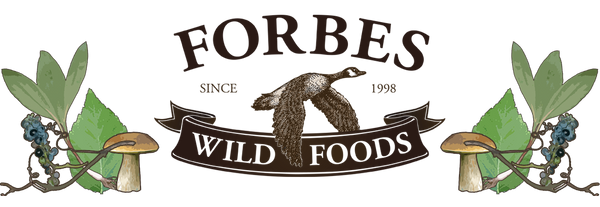Sea Lettuce
Sea Lettuce
Named for its ruffled sheet-like leaves, Sea Lettuce (Ulva Lactuca) is a type of green
algae (Chlorophyta). This group grows at or near the surface, and is found clinging to
rocks at low tide. Forbes Sea Lettuce is sustainably harvested and naturally dried in
Nova Scotia. It prefers nutrient rich waters, and can bloom significantly in those
conditions, sometimes to the detriment of sea vegetables found lower down. Cutting
the leaves for food maintains a more diverse population of algae. Keeping the hold-
fast (root) in place allows the crop to replenish itself.
Sea Lettuce not only looks like a leafy salad green; it can be used as one too.
Reconstitute the dried seaweed with a quick soak in tepid water. When tender,
drain, shred and dress with your favourite vinaigrette. Sea Lettuce also adds a briny
hint of the sea to soup. Use in a cream of wild leek recipe, or add to Japanese miso
soup along with tofu and green onions. Dried Sea Lettuce can be finely minced for
use as a salt substitute. It contains less sodium than sea salt, and is balanced by
potassium.
Like all sea vegetables, Sea Lettuce differs nutritionally from plants growing on land.
Sea vegetables have a higher content of minerals such as calcium, potassium and
iodine. They are also rich in protein, amino acids, iron, vitamins and soluble and
insoluble fiber. Compared to leaf lettuce, Sea Lettuce is far superior in protein, fiber
and iron content.
Named for its ruffled sheet-like leaves, Sea Lettuce (Ulva Lactuca) is a type of green
algae (Chlorophyta). This group grows at or near the surface, and is found clinging to
rocks at low tide. Forbes Sea Lettuce is sustainably harvested and naturally dried in
Nova Scotia. It prefers nutrient rich waters, and can bloom significantly in those
conditions, sometimes to the detriment of sea vegetables found lower down. Cutting
the leaves for food maintains a more diverse population of algae. Keeping the hold-
fast (root) in place allows the crop to replenish itself.
Sea Lettuce not only looks like a leafy salad green; it can be used as one too.
Reconstitute the dried seaweed with a quick soak in tepid water. When tender,
drain, shred and dress with your favourite vinaigrette. Sea Lettuce also adds a briny
hint of the sea to soup. Use in a cream of wild leek recipe, or add to Japanese miso
soup along with tofu and green onions. Dried Sea Lettuce can be finely minced for
use as a salt substitute. It contains less sodium than sea salt, and is balanced by
potassium.
Like all sea vegetables, Sea Lettuce differs nutritionally from plants growing on land.
Sea vegetables have a higher content of minerals such as calcium, potassium and
iodine. They are also rich in protein, amino acids, iron, vitamins and soluble and
insoluble fiber. Compared to leaf lettuce, Sea Lettuce is far superior in protein, fiber
and iron content.
Zurück nach All Products
← Vorheriges Produkt

